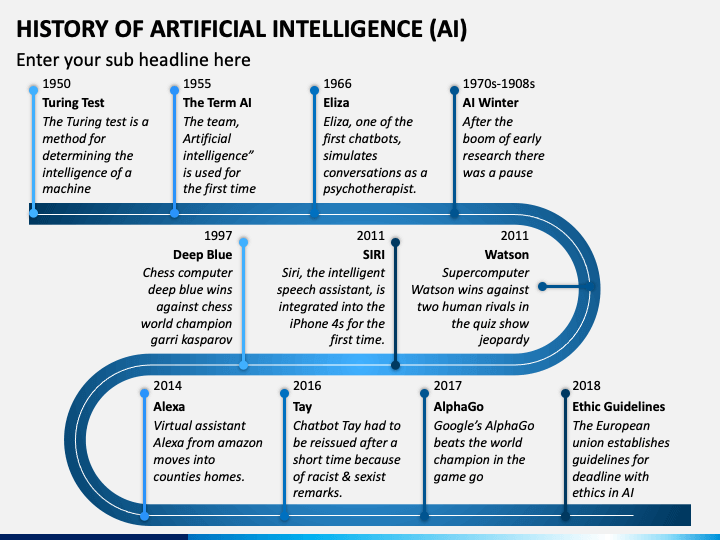Uncover the fascinating evolution of AI, from its humble beginnings in science fiction to its cutting-edge applications in reality.
Table of Contents
Artificial Intelligence (AI) has come a long way since its inception in the 1950s. What was once considered a figment of science fiction is now a crucial component of our daily lives, revolutionizing industries and reshaping the way we interact with technology. In this blog post series, we will explore the evolution of AI, its current applications, the benefits it offers, the challenges and ethical concerns it raises, the future direction of AI, and the intriguing question of whether a scenario like Skynet from the Terminator movies is possible in reality.
Introduction to Artificial Intelligence
AI, in its simplest form, refers to the ability of machines to mimic human intelligence and perform tasks that typically require human cognition, such as learning, reasoning, problem-solving, and perception. From virtual assistants like Siri and Alexa to self-driving cars and recommendation algorithms on streaming platforms, AI has become an integral part of our modern world.
Historical Context of AI
The roots of AI can be traced back to the 1950s when pioneers like Alan Turing and John McCarthy laid the foundations for the field. Over the decades, AI has seen significant advancements, from the development of expert systems and neural networks to the rise of machine learning and deep learning algorithms that power today’s AI applications.
Current Applications of AI
AI is being deployed across various industries, transforming processes and enhancing efficiency. In healthcare, AI is used for medical imaging analysis, drug discovery, and personalized treatment plans. In finance, AI powers fraud detection systems, algorithmic trading, and customer service chatbots. The educational sector benefits from AI through personalized learning platforms and intelligent tutoring systems.

Image courtesy of anjireddy-kata.medium.com via Google Images
Benefits of AI
The advantages of AI are numerous and far-reaching. AI enables businesses to streamline operations, optimize decision-making processes, and improve customer experiences. In fields like healthcare and environmental monitoring, AI can analyze vast amounts of data quickly and accurately, leading to better outcomes and advancements in research and innovation.
Challenges and Ethical Concerns of AI
Despite its benefits, AI poses various challenges and ethical dilemmas. There are concerns about data privacy, algorithmic bias, job displacement due to automation, and the potential misuse of AI systems for surveillance or malicious purposes. As AI becomes more prevalent in society, it is crucial to address these issues and ensure responsible AI development and deployment.

Image courtesy of www.analyticssteps.com via Google Images
Future Direction of AI
The future of AI holds exciting possibilities, with advancements in areas such as natural language processing, computer vision, and robotics driving innovation. AI is expected to play a significant role in shaping smart cities, autonomous vehicles, and personalized healthcare solutions. As AI technologies continue to evolve, we can expect to see new applications and opportunities emerge.
Can Skynet Happen?
The concept of a sentient AI system like Skynet, which takes control and poses a threat to humanity, is a popular trope in science fiction. However, the reality of AI today is far from the dystopian scenarios depicted in movies like Terminator. Current AI systems are limited in their capabilities and lack the autonomy or consciousness necessary to pose a significant existential threat. While it is essential to consider the potential risks of AI, the idea of a Skynet-like scenario remains firmly in the realm of fiction.

Image courtesy of sitn.hms.harvard.edu via Google Images
The Role of AI in Society
AI’s impact on society is profound, influencing how we work, communicate, and make decisions. As AI technologies continue to advance, it is essential to consider their implications for social norms, cultural practices, and ethical standards. Collaborations between humans and AI will become increasingly common, leading to new opportunities for innovation and creativity.
AI and Human Collaboration
Rather than replacing humans, AI has the potential to complement and enhance human capabilities. By working together with AI systems, humans can leverage the power of machine learning and automation to solve complex problems, generate new insights, and drive progress in various fields. Collaboration between humans and AI can lead to more efficient processes, better decision-making, and improved outcomes.

Image courtesy of www.reddit.com via Google Images
Conclusion
As we navigate the ever-changing landscape of AI, it is crucial to stay informed and engage in conversations about the impact of AI on society. While AI offers tremendous opportunities for innovation and progress, it also raises important ethical considerations and challenges that must be addressed. By understanding the history, applications, benefits, challenges, and future direction of AI, we can better prepare for a future where AI plays a central role in shaping our world.



Comments